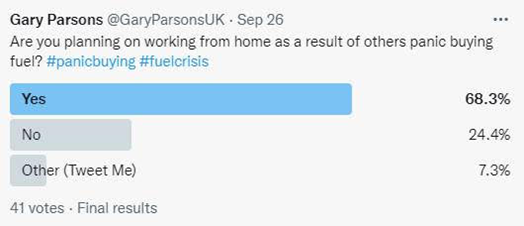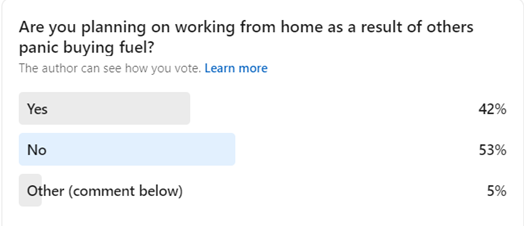
The recent fuel shortages were a blow to many employers, and caused significant disruption to normal working life. We recently ran a poll on Twitter and LinkedIn, and found that 68% of Twitter users, and 42% of LinkedIn users were planning on working from home as a result of the panic buying.




Although the fuel situation is improving slightly as of the last few weeks, it’s looking likely to be a challenging winter from the perspective of keeping employees productive. With COVID cases on the rise again, it’s looking likely that the government may bring “Plan B” into effect, which could see restrictions such as mask-wearing, and working from home orders returning for the winter period.
Even if we manage to avoid the reinstating of restrictions, there’s the energy crisis, the strain of “super cold”, and potential industrial action to name but a few stumbling blocks. Any of these could cause issues with getting your employees into the office, or at least keeping them productive if they are working from home.
It’s another period of intense uncertainty for individuals and businesses, but If the last few years have taught us anything, it’s that organisations can be incredibly resilient and agile when they need to be. But as we go from one crisis to the next, how do you ensure your employees are supported, stay engaged, and remain as valuable contributors to your team and your business?
Promoting employee wellbeing
With so much negativity and uncertainty around things that directly impact their daily lives, not to mention the potential psychological impact of returning to restrictions we hoped to be rid of, it should come as no surprise that without the right approach, your employees will be feeling the strain. Add to this disruption to your business and cashflow and uncertainty around what activity you’ll be able to continue with, employee mental health and wellbeing could be at an all-time low with the right approach.
People-focused businesses are successful businesses – and it’s more important than ever to put systems and initiatives in place to make sure your employees are protected and supported. Many employees are already at breaking point. Recent analysis by Glassdoor found that mentions of “employee burnout” on their platform were up by around 128% since May this year.
What you can do
- Make employee engagement a priority – start collecting anonymous feedback on how they are feeling and how they currently view the support they’re given (or not given)
- Review your existing policies and general approach to employee mental health and wellbeing – is it a priority?
Dealing with sickness
Speaking of employee wellbeing – a global health crisis is an ideal time to reassess how your business approaches sickness and time off. According to a recent poll by HR Grapevine, 68% of employers have permanently adopted hybrid working into their business. Whether an employee should or could still be working from home while unwell is an incredibly grey area, and while you still might need to assess things on a case-by-case basis, it’s important to set in stone your general approach and guidelines around sickness and hybrid working.
What you can do
- Review your policies – what do they say about sickness? How do you outline and make the distinction between being unwell and being too sick to work?
- Ensure your policies outline and reflect what should happen if an employee is self-isolating
Staying flexible
The seed for the future of flexible working was sown during COVID. In March 2020, a large number of employers were forced to quickly switch to some form of remote working and many then eventually put a number of temporary policies in place to cover this, continuing even after restrictions were lifted.
Despite this, there are signs that the stigma around flexible working is returning, with a 24% drop in remote job vacancies occurring between July and August. However, a recent poll has found that flexible working makes employees feel more empowered and trusted, and therefore able to do their job more effectively. Without the right approach, many businesses run the risk of forgetting vital lessons that were learned during COVID, and returning to a more static approach which may hold them back when other challenges come along.
From a purely practical perspective, to ensure your business can stay agile, you should ensure that employee contracts and handbooks have the room and the right language to accommodate flexibility.
What you can do
- Ask your employees for feedback -does remote/hybrid working help them feel more trusted and productive? How do they want to approach their role going forward?
- Remember that employees have a statutory right to ask for flexible working if they have been working for you for at least 26 weeks. You must deal with this in a “reasonable manner”.
- Conduct a review of employment contracts and employee handbooks to ensure that you have everything in place to support flexible, remote or hybrid working in the long-term. An HR expert like Talk Staff can help you with this.
Lay-offs and furlough
Although it’ll be an eventuality you’ll want to avoid, it’s a strong possibility that the various challenges we’ve set out in this post could lead to some difficult decisions around staff and whether they can continue working for your business at such a challenging time.
As it stands, no government-funded furlough schemes are expected to be reintroduced to support businesses impacted by COVID. As we’ve covered in a previous post, private or “non-government” furlough is a possibility you could explore should you need to. Whatever your situation or your chosen approach, in times of uncertainty it’s advisable to review employee contracts to ensure that they are sufficient in protecting your business and the rights of your employees.
What you can do
- Review employee contracts to ensure that mechanisms such as lay off and similar useful furlough clauses are available at a time where business trading is significantly impacted at short-notice, without the need for further additional agreements that may create friction.
Get a winter check-up for your business
Make sure you’re ready for anything this winter with a Workplace Winter Health Check.
We’ll review everything to assess how agile you are, then give you actionable insight into how you can make yourselves ready for uncertainty.
Content can be adapted to suit your business but typically involves:
- Sick policies and procedures
- Remote and hybrid working policies
- Lay-off and furlough clauses
- Employee wellbeing and engagement
From £125+VAT
Last Updated on 9 months by Gary Parsons





